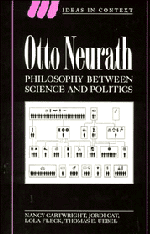Introduction
Published online by Cambridge University Press: 17 December 2009
Summary
Science and life can be connected, above all by the setting which encompasses both.
Among economists, Otto Neurath is most well known for his views about moneyless economies; among historians, for his work on full socialisation during the short-lived Bavarian revolution of 1919; among educators, for his work on social museums. Among philosophers, he is surely most widely known for his metaphor of sailors rebuilding their ships at sea, which he used to attack foundational accounts of knowledge. This book is about Neurath's philosophy and it is about his political life. And it is about the connection between the two, which left neither of them unchanged.
As a young man near the beginning of his career, fifteen years before the official founding of the Vienna Circle, Otto Neurath wrote his first extended attack on the hunt for certainty in science and in life. There he urged: ‘The thinking of a man during his whole life forms a psychological unity, and only in a very limited sense can one speak of trains of thought per se’ This description perfectly fits Neurath himself. Otto Neurath was a philosopher, a publicist, an activist, a bureaucrat, a scholar, a social scientist and a Marxist. His philosophy will be our central topic. But philosophy for Neurath was not a discipline. His philosophical thought did not evolve within a closed system, new philosophical views emerging from older ones adjusted by new philosophical insights and arguments. Indeed, as Neurath saw it, the disciplines themselves crystallised into separate self-contained systems as a result of useful but false abstraction.
- Type
- Chapter
- Information
- Otto NeurathPhilosophy between Science and Politics, pp. 1 - 6Publisher: Cambridge University PressPrint publication year: 1996

